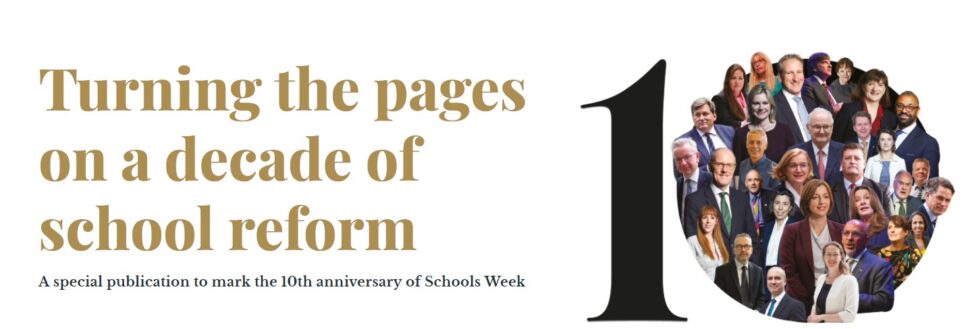Former schools minister Nick Gibb has said academisation was often just an “expensive process of rebadging”, and admitted it was “naïve” to let “charismatic” heads lead big trusts without “sufficient checks and regulations” in place.
The former Conservative MP has written a book, published today, on lessons learned from overseeing sweeping education reforms during his ten years in office between 2010 and 2023.
In it, he talks about “blowing up the concrete” of “progressive ideology” as he and then education secretary Michael Gove embarked on a “knowledge-rich” reform agenda that promised to hand power to headteachers.
Many regard the school reforms as the past Conservative government’s most successful. But it wasn’t without controversy, high-profile scandals and sometimes widespread outrage from parts of the schools sector.
Here are 13 interesting policy reflections that Schools Week picked out from a first-read of the book …
1. Gibb reveals ‘greatest legacy’ of his reforms …
Gibb is, unsurprisingly, very positive about his government’s education reforms, saying the “movement that is taking place in English schools has surpassed even my most optimistic hopes”.
Many people have pointed to England’s rise up the international league tables as evidence the reforms were successful.
But Gibb said the “greatest legacy” of his policies was actually sparking an “effervescence of new thinking on teaching methods and curriculum”.
Reforms have “allowed teachers to challenge the dominant orthodoxies within English education and create an ecosystem of school autonomy in which new, evidence-led ideas can thrive” – a “free market for ideas”.
2. … but can’t say policies boosted attainment (yet)
Gibb cites the international league table rankings rises, but also points out that “we cannot yet say for sure whether pupil attainment at GCSE has improved due to our reforms. However, I believe this moment is not far away from arriving.”
He pointed to the National Reference Test (an external test sat by a sample of year 11s each year to monitor how cohorts perform over time) showing a “steady rise” in maths attainment pre-Covid (although English performance actually declined).
The impact of Covid has made drawing conclusions from the more recent data trickier. But Gibb said he takes “succour from the fact the continuity in results [despite Covid disruption] … may suggest real-term improvement”.
If the NRT does go on to show improvements in attainment, “schools and pupils will be able to celebrate for the first time a rise in results that – because of the robust accountability system we have created – cannot be accused of inflation,” Gibb said.
“This should be our legacy at the secondary level: not just improvement, but improvement in which the public can believe.”
3. Ideology lessons from smuggling propaganda into Soviet Russia
Gibb says he and Gove (pictured below) had to “blow up the concrete” of “progressivist ideology” in education from 2010 to 2015. This fight features heavily throughout the book.
But there is a rather intriguing backstory for how Gibb’s views on ideologies were shaped.
After graduating from Durham University in the 80s, he worked with the Russian Solidarist Movement – an organisation set up by Russian emigres to fight communism – to smuggle free-market propaganda into the Soviet Union. Posing as a tourist, he delivered letters to dissidents behind the Iron Curtain.

“To this day, one of the most nerve-wracking moments of my life was walking through Russian immigration with 100 letters stuffed into the sides of my boots… it was exhilarating work, fighting a battle of ideas against communism one letter at a time.”
On visiting the country, he was “shocked” at the compliance of an “entire population willing to go along with an ideology whose failure to fulfil its promises seemed apparent in every facet of their lives”.
“I do not for a moment draw a parallel of any sort between Russian communism and the progressivist ideology in English schools. However, I do want to make the argument that ideas matter.”
4. His one piece of advice for new ministers …
Gibb retells positive experiences of working with sector experts to lead various reviews and groups.
He said “selecting the right people for any official post deserved hours of time and research. If I could share one piece of advice for a new government minister, it would be that the power of appointment is your single most effective lever for bringing about change.”
He warned against appointing people because they had been recommended by the department, fellow party members or were government supporters.
“What mattered was not their closeness to the government or party affiliation, but their views on education,” he adds.
5. 10-year qualification reform warning
Gibb oversaw huge qualification and assessment reforms, including overhauling GCSEs, writing a new national curriculum and establishing exams regulator Ofqual to end grade inflation.
The Labour government has launched its own curriculum and assessment review, however minsters have said any changes will be “evolution not revolution”.
But Gibb warned: “For any politician hoping to pursue examination reform, be warned: it will take at the very least two parliaments to complete.”
6. EBacc regrets …
The EBacc was introduced in 2010 to encourage pupils to study a “core academic curriculum”. The proportion of pupils studying the EBacc subjects rose from 22 per cent that year to 40 per cent in 2016, but hasn’t moved much since.
Gibb has “regrets” about the lack of progress.
“Back in 2010, I envisaged that the EBacc would be a physical certificate posted to all pupils who achieve it following their results.”
He said the EBacc would have “gained more social currency than it has” by, for instance, featuring in school leavers’ CVs.
However, the plan was blocked by Dominic Cummings, then a special adviser at the DfE, who thought the civil service “would fail to deliver on such a plan”.
Gibb said the main limiting factor on uptake was pupils being “infamously reluctant” to study modern foreign languages.
There “remains a dire need for more language study” in secondary schools, he said, adding: “For that reason alone, I believe the EBacc remains relevant.”
7. Academisation sometimes just ‘expensive rebadging’
While talking positively about academy reforms on the whole, Gibb did express some misgivings (and perhaps more so than any other policy featured in the book).
He said academy failures had showed early on that academisation on its own would not “automatically lead to better outcomes for its pupils. Fundamentally a school will only improve if what is happening in the classroom improves.”

And he was highly critical of some academy converters. “In many schools, academisation proved to be a time-consuming and expensive process of rebadging … but in all fundamental rights remained the same.
“If the school was already high performing, there was little to lose from this process. But I feared that too many schools that were mediocre or worse were becoming academies only to carry on teaching in much the same was as before.”
8. The trust failures: ‘mates MATs’ and empire building …
Gibb admitted there were “high-profile [academy] failures which ran the risk of discrediting the policy as a whole” in the early days.
However he said the government’s desire to “expand the programme at speed” meant they were “willing to tolerate the occasional misstep in order to serve the greater good of a wholesale transformation”.
He had two “troubling” categories of MATs: ‘mates’ MATs’, where schools grouped together with other “friendly schools in the hope of avoiding too much oversight” and “empire-building MATs, which pursued growth as a good in and of itself, with school improvement as a distant afterthought”.
9. … and oversight ‘naivety’ behind superhead scandals
Gibb also said there was an “unnerving line that could be drawn between charismatic headteachers we cited in speeches and financial mismanagement in newly created MATs”. Examples included in the book were E-ACT, Durand Academy and Perry Beeches.
“I do not believe it was a coincidence that many politically lauded headteachers went on to lead scandal-beset trusts. Professional success is … domain-specific. For us to expect successful heads to be successful administrators of large trusts with considerable budgets without putting sufficient checks and regulations in place was naïve.”
He pointed to “tawdry” purchases by early academy trusts – including on a Jaguar car, property in Normandy and luxury flats.
But he added that “some defended this as ‘creative destruction’ necessary for sector transformation” and there were also examples of mismanagement in council schools, too.
“Whether academies were more prone to mismanagement or not, there was a ‘Wild West’ atmosphere during these early days, and the level of oversight needed to improve”.
Gibb pointed to introducing regional school commissioners (now regional directors) as an example of how the government improved oversight.
10. But ‘ignore cookie-cutter jibes’ over best MATs
He also highlighted many “magical MATs” who have transformed schools in deprived areas.
One example cited is the Harris Federation, although Gibb said the trust has “never been universally popular” despite turnaround success. He pointed to criticism over high staff turnover and its CEO’s £500k salary.
But any criticism “must be seen in the context of the schools that Harris academies have superseded … where failure was entrenched, disorder was normalised, and nobody believed improvement was possible,” he adds.
We must ignore all of the jibes about ‘cookie-cutter’ schools. Replicating success is a virtue
The trust’s schools are now “by orders of magnitude better for pupils than its predecessor”.
Another criticism of turnaround trusts is they are overly prescriptive.
But Gibb says “we must ignore all of the jibes about ‘cookie-cutter’ schools. Replicating success is a virtue, and if we have multiple Harris Federations across the country, one can only imagine how much better the prospects of English children would be.”
11. Academy transformation in ‘emulation, not autonomy’
Gove and Gibb sold their academy dream by offering heads autonomy. But with the emergence of multi-academy trusts, some academies say they have even less autonomy than before they converted.
But Gibb says in his book the “transformational power of the academy movement is not autonomy (which is crucial), but emulation”.
The “bold visions” that top schools were “able to pioneer are now being emulated by hundreds, if not thousands, of schools across the country”.
“Nobody can ignore the existence of outstanding schools where pupils from deprived backgrounds perform as well as their peers at the most exclusive schools in the country.
“Our reforms – sustained, protected, and built upon over nearly 15 years – made this possible, but it was teachers who seized the new freedoms and revolutionised our understanding of what makes good teaching.”
12. ‘Trad’ label ‘doesn’t serve best schools well’
On the traditional versus progressive education debate, Gibb (firmly in the trad camp) says he “increasingly” believes the terms “obscure more than they reveal in education”.
“When I consider the work of teachers at our most innovative schools, the ‘traditionalist’ label does not serve them well. Yes they were devising an alternative to the child-centred progressivist orthodoxy, but ‘traditionalism’ implied a desire to move backwards, perhaps to a mythical period known as the 1950s where uniforms were smart, teachers were respected and pupils were translating English to Latin by lower fifth.”
But this “did not capture the new types of teaching our reforms had unleashed… these schools were pioneering, basing their decisions on the high-quality evidence from cognitive science, controlled trials, and exemplar schools. For this reason, I prefer to use the term ‘evidence-led’ instead of ‘traditionalist’.”
13. And lastly … yes, he did (at times) want the top job
Despite his long-serving stint and experience as schools minister, Gibb was never made education secretary.
But he admits that he did “on occasion, hope that I might be offered the top job, but my fate was to be always the bridesmaid, never the bride.
“Instead I sought to be a figure of continuity and institutional memory for both ministers and civil servants.”







Your thoughts